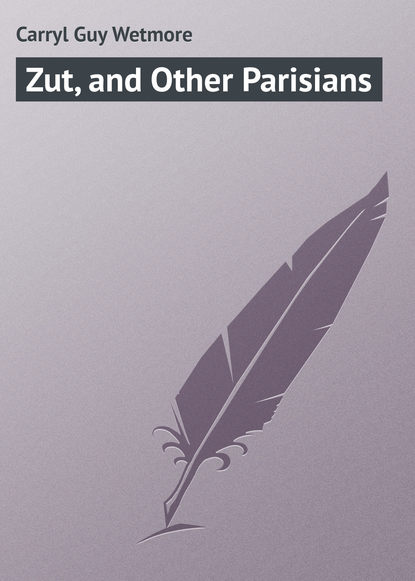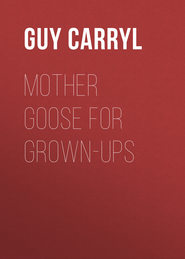По всем вопросам обращайтесь на: info@litportal.ru
(©) 2003-2024.
✖
Zut, and Other Parisians
Настройки чтения
Размер шрифта
Высота строк
Поля
"Gueuse!" screamed Alexandrine from the desk. And so they parted.
Now, even at this stage, an armed truce might still have been preserved, had Zut been content with the evil she had wrought, and not thought it incumbent upon her further to embitter a quarrel that was a very pretty quarrel as it stood. But, whether it was that the milk and fish of the Salon Malakoff lay sweeter upon her memory than any of the familiar dainties of the épicerie Caille, or that, by her unknowable feline instinct, she was irresistibly drawn toward the scent of violet and lilac brillantine, her first visit to the Sergeot was soon repeated, and from this visit other visits grew, until it was almost a daily occurrence for her to saunter slowly into the salle de coiffure, and there receive the food and homage which were rendered as her undisputed due. For, whatever was the bitterness of Espérance toward Madame Caille, no part thereof descended upon Zut. On the contrary, at each visit her heart was more drawn toward the sleek angora, and her desire but strengthened to possess her peer. But white angoras are a luxury, and an expensive one at that, and, however prosperous the Salon Malakoff might be, its proprietors were not as yet in a position to squander eighty francs upon a whim. So, until profits should mount higher, Madame Sergeot was forced to content herself with the voluntary visits of her neighbor's pet.
Madame Caille did not yield her rights of sovereignty without a struggle. On the occasion of Zut's third visit, she descended upon the Salon Malakoff, robed in wrath, and found the adored one contentedly feeding on fish in the very bosom of the family Sergeot. An appalling scene ensued.
"If," she stormed, crimson of countenance, and threatening Espérance with her fist, "if you must entice my cat from her home, at least I will thank you not to give her food. I provide all that is necessary; and, for the rest, how do I know what is in that saucer?"
And she surveyed the duck-clad assistants and the astounded customers with tremendous scorn.
"You others," she added, "I ask you, is it just? These people take my cat, and feed her —feed her – with I know not what! It is overwhelming, unheard of – and, above all, now!"
But here the peaceful Hippolyte played trumps.
"It is the privilege of the vulgar," he cried, advancing, razor in hand, "when they are at home, to insult their neighbors, but here – no! My wife has told me of you and of your sayings. Beware! or I shall arrange your affair for you! Go! you and your cat!"
And, by way of emphasis, he fairly kicked Zut into her astonished owner's arms. He was magnificent, was Hippolyte!
This anecdote, duly elaborated, was poured into the ears of Abel Flique an hour later, and that evening he paid his first visit in many months to Madame Caille. She greeted him effusively, being willing to pardon all the past for the sake of regaining this powerful friend. But the glitter in the agent's eye would have cowed a fiercer spirit than hers.
"You amuse yourself," he said sternly, looking straight at her over the handful of raisins which she tendered him, "by wearying my friends. I counsel you to take care. One does not sell inferior eggs in Paris without hearing of it sooner or later. I know more than I have told, but not more than I can tell, if I choose."
"Our ancient friendship" – faltered Alexandrine, touched in a vulnerable spot.
" – preserves you thus far," added Flique, no less unmoved. "Beware how you abuse it!"
And so the calls of Zut were no longer disturbed.
But the rover spirit is progressive, and thus short visits became long visits, and finally the angora spent whole nights in the Salon Malakoff, where a box and a bit of carpet were provided for her. And one fateful morning the meaning of Madame Caille's significant words "and above all, now!" was made clear.
The prosperity of Hippolyte's establishment had grown apace, so that, on the morning in question, the three chairs were occupied, and yet other customers awaited their turn. The air was laden with violet and lilac. A stout chauffeur, in a leather suit, thickly coated with dust, was undergoing a shampoo at the hands of one of the duck-clad, and, under the skillfully plied razor of the other, the virgin down slid from the lips and chin of a slim and somewhat startled youth, while from a vaporizer Hippolyte played a fine spray of perfumed water upon the ruddy countenance of Abel Flique. It was an eloquent moment, eminently fitted for some dramatic incident, and that dramatic incident Zut supplied. She advanced slowly and with an air of conscious dignity from the corner where was her carpeted box, and in her mouth was a limp something, which, when deposited in the immediate centre of the Salon Malakoff, resolved itself into an angora kitten, as white as snow!
"Epatant!" said Flique, mopping his perfumed chin. And so it was.
There was an immediate investigation of Zut's quarters, which revealed four other kittens, but each of these was marked with black or tan. It was the flower of the flock with which the proud mother had won her public.
"And they are all yours!" cried Flique, when the question of ownership arose. "Mon Dieu, yes! There was such a case not a month ago, in the eighth arrondissement – a concierge of the avenue Hoche who made a contrary claim. But the courts decided against her. They are all yours, Madame Sergeot. My felicitations!"
Now, as we have said, Madame Sergeot was of a placid temperament which sought not strife. But the unprovoked insults of Madame Caille had struck deep, and, after all, she was but human.
So it was that, seated at her little desk, she composed the following masterpiece of satire:
Chère Madame, – We send you back your cat, and the others – all but one. One kitten was of a pure white, more beautiful even than its mother. As we have long desired a white angora, we keep this one as a souvenir of you. We regret that we do not see the means of accepting the kind offer you were so amiable as to make us. We fear that we shall not find time to shampoo your cat, as we shall be so busy taking care of our own. Monsieur Flique will explain the rest.
We pray you to accept, madame, the assurance of our distinguished consideration,
Hippolyte and Espérance Sergeot.
It was Abel Flique who conveyed the above epistle, and Zut, and four of Zut's kittens, to Alexandrine Caille, and, when that wrathful person would have rent him with tooth and nail, it was Abel Flique who laid his finger on his lip, and said, —
"Concern yourself with the superior kitten, madame, and I concern myself with the inferior eggs!"
To which Alexandrine made no reply. After Flique had taken his departure, she remained speechless for five consecutive minutes for the first time in the whole of her waking existence, gazing at the spot at her feet where sprawled the white angora, surrounded by her mottled offspring. Even when the first shock of her defeat had passed, she simply heaved a deep sigh, and uttered two words, —
"Oh, Zut!"
The which, in Parisian argot, at once means everything and nothing.
Caffiard
DEUS EX MACHINA
THE studio was tucked away in the extreme upper northeast corner of 13 ter rue Visconti, higher even than that cinquième, dearly beloved of the impecunious, and of whoso, between stairs and street odors, chooses the lesser evil, and is more careful of lungs than legs. After the six long flights had been achieved, around a sharp corner and up a little winding stairway, was the door which bore the name of Pierre Vauquelin. Inside, after stumbling along a narrow hall, as black as Erebus, and floundering through a curtained doorway, one came abruptly into the studio, and, in all probability, fell headlong over a little rattan stool, or an easel, or a box of paints, and was picked up by the host, and dusted, and put to rights, and made much of, like a bumped child. Thus restored to equanimity one was better able to appreciate what Pierre called la Boîte.
The Box was a room eight metres in width by ten in length, with a skylight above, and a great, square window in the north wall, which latter sloped inward from floor to ceiling, by reason of the mansarde roof. Of what might be called furniture there was but little, a Norman cupboard of black wood, heavily carved, a long divan, contrived from various packing boxes and well-worn rugs, a large, square table, a half dozen chairs, three easels, and a repulsive little stove with an interminable pipe, which, with its many twists and turns, gave one the impression of a thick, black snake, that had, a moment before, been swaying about in the room, and had suddenly found a hole in the roof through which to thrust its head.
But of minor things the Box was full to overflowing. The Norman cupboard was crammed with an assortment of crockery, much of it sadly nicked and cracked, the divan was strewn with boxes of broken pastels, paint-brushes, and palettes coated with dried colors, the table littered with papers, sketches, and books, and every chair had its own particular trap for the unwary, in the form of thumb-tacks or a glass half full of cloudy water: and in the midst of this chaos, late on a certain mid-May afternoon, stood the painter himself, with his hands thrust deep into the pockets of his corduroy trousers, and his back turned upon the portrait upon which he had been at work. It was evident that something untoward was in the air, because Pierre, who always smoked, was not smoking, and Pierre, who never scowled, was scowling.
In the Quartier – that Quartier which alone, of them all, is spelt with a capital Q – there was, in ordinary, no gayer, more happy-go-lucky type than this same Pierre. He lived, as did a thousand of his kind, on eighty sous a day (there were those who lived on less, pardi!), and breakfasted, and dined, at that, – yes, and paid himself an absinthe at the Deux Magots at six o'clock, and a package of green cigarettes, into the bargain. For the rest of the time, he was understood to be working on a portrait in his studio, and, what is more surprising, often was. There was nothing remarkable about Pierre's portraits, except that occasionally he sold one, and for money – for actual money, the astonishing animal! But if any part of the modest proceeds of such a transaction remained, after the rent had been paid and a new canvas purchased, it was not the caisse d'épargne which saw it, be sure of that! For Pierre lived always for the next twenty-four hours, and let the rest of time and eternity look out for themselves.
Yet he took his work seriously. That was the trouble. Even admitting that, thus far, his orders had come only from the more prosperous tradesmen of the Quartier, did that mean, par exemple, that they would not come in time from the millionaires of the sixteenth arrondissement? By no means, whatever, said Pierre. To be sure, he had never had the Salon in the palm of his hand, so to speak, but what of that? Jean-Paul himself would tell you that it was all favoritism! So Pierre toiled away at his portrait painting, and made a little competency, but, if the truth were told, no appreciable progress from year's beginning to year's end.
For once, however, his luck had played him false. The fat restaurateur, whose wife's portrait he had finished that afternoon and carried at top speed, with the paint not yet dry, to the rue du Bac, was out of town on business, and would not return until the following evening; and that, so far as Pierre was concerned, was quite as bad as if he were not expected until the following year. Pierre's total wealth amounted to one five-franc piece and three sous, and he had been relying upon the restaurateur's four louis, to enable him to fulfill his promise to Mimi. For the next day was her fête, and they were to have breakfasted in the country, and taken a boat upon the Seine, and returned to dine under the trees. Not at Suresnes or St. Cloud, ah, non! Something better than that – the true country, sapristi! at Poissy, twenty-eight kilometres from Paris. All of which meant at least a louis, and, no doubt, more! And where, demanded Pierre of the great north window, where was a louis to be found?
For there was a tacit understanding among the comrades in the Quartier that there must be no borrowing and lending of money. It was a clause of their creed, which had been adopted in the early days of their companionship, for what was, clearly, the greatest general good, the chances being that no one of them would ever possess sufficient surplus capital either to accommodate another or to repay an accommodation. For a moment, to be sure, the thought had crossed Pierre's mind, but he had rejected it instantly as impracticable. Aside from the unwritten compact, there was no one of them all who could have been of service, had he so willed. Even Jacques Courbet, who possessed a disposition which would have impelled him to chop off his right hand with the utmost cheerfulness, if thereby he could have gratified a friend, was worse than useless in this emergency. Had it been a matter of forty sous – but a louis! As well have asked him for the Vénus de Milo, and had done with it.
So it was that, with the premonition of Mimi's disappointed eyes cutting great gaps in his tender heart, Pierre had four times shrugged his shoulders, and quoted to himself this favorite scrap of his remarkable philosophy, – "Oh, lala! All this will arrange itself!" and four times had paused, in the act of lighting a cigarette, and plunged again into the depths of despondent reverie. As he was on the point of again repeating this entirely futile operation, a distant clock struck six, and Pierre, remembering that Mimi must even now be waiting for him at the west door of St. Germain-des-Prés, clapped on his cap, and sallied forth into the gathering twilight.
It was apéritif hour at the Café des Deux Magots, and the long, leather-covered benches against the windows, and the double row of little marble-topped tables in front were rapidly filling, as Pierre and Mimi took their places, and ordered two Turins à l'eau. A group of American Beaux Arts men at their right were chattering in their uncouth tongue, with occasional scraps of Quartier slang, by way of local color, and now and again hailing a newcomer with exclamations, apparently of satisfaction, which began with "Hello!" The boulevard St. Germain was alive with people, walking past with the admirable lack of haste which distinguishes the Parisian, or waiting, in patient, voluble groups, for a chance to enter the constantly arriving and departing trams and omnibuses; and an unending succession of open cabs filed slowly along the curb, their drivers scanning the terrasse of the café for a possible fare. The air was full of that mingled odor of wet wood pavements and horse-chestnut blossoms, which is the outward, invisible sign of that most wonderful of inward and spiritual combinations – Paris and Spring! And, at the table directly behind Pierre and Mimi sat Caffiard.
There was nothing about Caffiard to suggest a deus ex machina, or anything else, for that matter, except a preposterously corpulent old gentleman with an amiable smile. But in nothing were appearances ever more deceitful than in Caffiard. For it was he, with his enormous double chin, and his general air of harmless fatuity, who edited the little colored sheet entitled La Blague, which sent half Paris into convulsions of merriment every Thursday morning, and he who knew every caricaturist in town, and was beloved of them all for the heartiness of his appreciation and the liberality of his payments. In the first regard he was but one of many Parisian editors: but in the second he stood without a peer. Caran d'Ache, Léandre, Willette, Forain, Hermann Paul, Abel Faivre – they rubbed their hands when they came out of Caffiard's private office, and if the day chanced to be Saturday, there was something in their hands worth rubbing. A fine example, Caffiard!
Mimi's black eyes sparkled like a squirrel's as she watched Pierre over the rim of her tumbler of vermouth. She was far from being blind, Mimi, and already, though they had been together but six minutes, she had noted that unusual little pucker between his eyebrows, that sad little droop at the corners of his merry mouth. She told herself that Pierre had been overworking himself, that Pierre was tired, that Pierre needed cheering up. So Mimi, who was never tired, not even after ten hours in Madame Fraichel's millinery establishment, secretly declared war upon the unusual little pucker and the sad little droop.
"Voyons donc, my Pierrot!" she said. "It is not a funeral to which we go to-morrow, at least! Thou must be gay, for we have much to talk of, thou knowest. One dines at La Boîte?"
"The dinner is there, such as it is," replied Pierre gloomily.
"What it is now, is not the question," said Mimi, with confidence, "but what I make of it – pas? And then there is to-morrow! Oh, lala, lalala! What a pleasure it will be, if only the good God gives us beautiful weather. Dis, donc, great thunder-cloud, dost thou know it, this Poissy?"
Pierre had begun a caricature on the back of the wine-card, glancing now and again at his model, an old man selling newspapers on the curb. He shook his head without replying.
"Eh, b'en, my little one, thou mayest believe me that it is of all places the most beautiful! One eats at the Esturgeon, on the Seine, – but on the Seine, with the water quite near, like that chair. He names himself Jarry, the proprietor, and it is a good type – fat and handsome. I adore him! Art thou jealous, species of thinness of a hundred nails? B'en, afterwards, one takes a boat, and goes, softly, softly, down the little arm of the Seine, and creeps under the willows, and, perhaps, fishes. But no, for it is the closed season. But one sings, eh? What does one sing? Voyons!"
She bent forward, and, in a little voice, like an elf's, very thin and sweet, hummed a snatch of a song they both knew.
"C'est votre ami Pierrot qui vient vous voir:
Bonsoir, madame la lune!"








